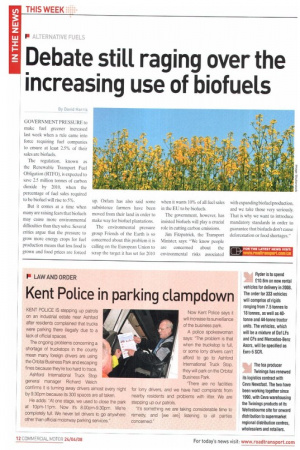P ALTERNATIVE FUEL (
Page 12

If you've noticed an error in this article please click here to report it so we can fix it.
Debate still raging over the increasing use of biofuels
By David Harris GOVERNMENT PRESSURE to make fuel greener increased last week when a rule came into force requiring fuel companies to ensure at least 25% of their sales are biofuels.
The regulation, known as the Renewable Transport Fuel Obligation (RTFO), is expected to save 2.5 million tonnes of carbon dioxide by 2010, when the percentage of fuel sales required to be biofuel will rise to 5%.
But it comes at a time when many are raising fears that biofuels may cause more environmental difficulties than they solve. Several critics argue that the pressure to grow more energy crops for fuel production means that less food is grown and food prices are forced up. Oxfam has also said some subsistence farmers have been moved from their land in order to make way for biofuel plantations.
The environmental pressure group Friends of the Earth is so concerned about this problem it is calling on the European Union to scrap the target it has set for 2010 when it wants 10% of all fuel sales in the EU to be biofuels.
The government, however, has insisted biofuels will play a crucial role in cutting carbon emissions.
Jim Fitzpatrick, the Transport Minister, says: "We know people are concerned about the environmental risks associated with expanding biofuel production, and we take those very seriously. That is why we want to introduce mandatory standards in order to guarantee that biofuels don't cause deforestation or food shortages."
FOR THE LATEST HEWS VISIT:
www.roadtransport.comicm












































































































































































